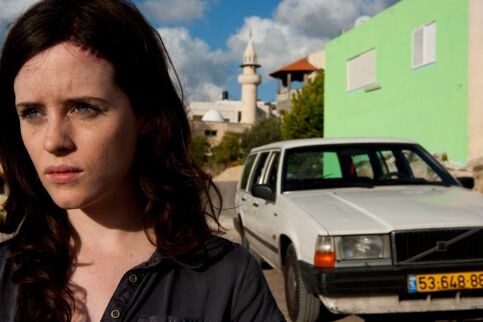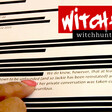The Electronic Intifada 15 April 2011

Claire Fox plays Erin, the granddaughter of a mandate-era British soldier, in The Promise.
Nothing is guaranteed to arouse passions and stir consciences more than a great film dramatization that shines a light on the truth of an issue in ways that earnest documentaries and studious literature often do not.
So it is with The Promise, an epic series that entranced many Palestinians who had the chance to view it in the UK, along with others astonished by its forthright and honest treatment of Palestine both in the final years of the British mandate and now. As a bold and uncompromising piece of TV scheduling by Channel 4, it was outstanding.
Unsurprisingly the TV presentation of the series outraged several pro-Israel lobby groups although one can wonder if the intensity of their objections might be more due to the sad human reality of the Israeli occupation being brought home more effectively than usual. There is now intense pressure on television regulators in the UK and France to take action. France’s Canal + has already been forced to make concessions by running an announcement prior to each episode to state it is fiction.
What makes The Promise both a gripping yarn and an exquisitely revealing story is the clever device of setting a naive young girl on a quest to retrace the footsteps of her dying grandfather, a British soldier in Mandate Palestine. As she delves into his diary of 1946-48, the story of the soldier’s misfortunes unfolds, and the girl loses her innocence as she is forced to brutally confront the reality of Israel past and present.
The response of Palestinians who have seen it so far can be best summed up by author and academic Dr. Ghada Karmi, who told me: “It was so good, I couldn’t believe it. I think Channel 4 was extremely brave and impressive, and it is disappointing that critics of the film do not understand how much of a sea change it was to have a program like this.”
The critic Rachel Cooke, writing in the New Statesmen, sang its praises: “Is Peter Kosminsky’s epic new drama set in Mandate-era Palestine and 21st-century Israel fantastic? Yes, it is. Ambitious, well-written, superbly acted and expertly made, it is also provocative and challenging: the possibility exists that it might even change people’s minds.”
The genius of the drama, written and directed by award-winning documentary filmmaker Peter Kosminsky, is to allow the viewer to see the world through the eyes of the teenage ingenue, Erin (played by Claire Fox). The diary of Sergeant Len Matthews (Christian Cooke) brings historic events to life on screen, and through her sequential reading of the diary, as part of her contemporary inquiry into what happened in 1948, both past and present are cunningly interwoven. Flashbacks of the last throes of the British Mandate era provide a narrative counterpoint that draws the viewer into what is not merely a backstory, but an integral element in the present narrative.
Perhaps it is the vivid recreation of the British soldier’s experience of the past that provoked much of the outrage because we are reminded of the full extent of Jewish terrorism in the last years of the mandate. Episodes depict the King David Hotel bombing, the kidnapping and murder of British soldiers and the Deir Yassin massacre. A crucial romantic thread reveals the deployment of Jewish honeytrap hostesses whose job is to gather intelligence by seducing guileless troops. A central character, German Jewish immigrant Clara Rosenbaum (Katharina Schuttler), has an affair with the sergeant but turns out to be secretly working with the Irgun, one of the pre-state Zionist militias.
The rough and ambiguous nature of the British army’s dealings with Palestinians is illustrated when the sergeant befriends Palestinian tea vendor Abu Hassan (Ali Suliman) who is being abused by fellow British troops; their close relationship and the unfolding drama as Abu Hassan’s family are forced to flee literally provide the key to one mystery behind The Promise.
The dramatic counterpoint of the present exposes a raw nerve for Israel and Palestine alike. Erin, staying with the rich family of an Israeli school friend, becomes close to her brother, a former Israeli soldier turned peace campaigner (played by Itay Tiran), who survives a suicide bombing of a Tel Aviv cafe. He is at odds with his father, a former Israeli general, providing the opening for a number of explicit denunciations — of Israel’s occupation, of the Israeli army itself and of Israel’s wall in the occupied West Bank, characterized as having nothing to do with security and more to do with a crude land grab.
But Erin also ends up just as close to the Israeli general’s Palestinian counterpart, also a former combatant (played by Haaz Sleiman), who spirits her (with dramatic license extended beyond comprehensible limits) via a tunnel into Gaza, where she is caught up in an Israeli military house demolition in reprisal for the bombing.
In the greatest coincidence of all, in the midst of the demolition, Erin stumbles across the elderly daughter of the tea vendor, whose hand had once had been offered in marriage to her grandfather. At this moment the real meaning of The Promise is brought home in a dramatic twist.
Kosminsky’s films are trailblazers that generally cut an ethical swathe through war zones, no-go areas and the minefields of social and political controversy. The Promise turned out to be his toughest challenge yet. Seven years in the making, it presents a fictionalized account that is nevertheless thoroughly grounded in the research that is the hallmark of his drama-documentary style.
Describing the drama in his own words, Kosminsky wrote in The Guardian: “Israel is isolated, loathed and feared in equal measure by its neighbors, finding little sympathy outside America for its uncompromising view of how to defend its borders and secure its future. How did Israel squander the compassion of the world within a lifetime? That’s the question The Promise sets out to explore” (“A film-maker’s eye on the Middle East,” 28 January 2011).
In an interview in the Jewish Chronicle, Kosminsky said it did a disservice to a complicated situation to present easy or pat solutions, so he “tried to show right and wrong on both sides.” He also described the difficulties filming during his first ever visit to Israel: “Although no one actually stopped us making the film, we received no official help whatsoever, possibly due to the subject matter. I wanted to film on the site of the old Acre prison. We were depicting the martyrdom of Dov Gruner, one of the Jewish resistance heroes. But we were refused without any explanation. Things like that happened all the time. Locations were withdrawn literally at the last minute as we were about to start filming. The Israeli crew were terrific but we didn’t get much help from the authorities” (“Interview: Peter Kominsky,” 3 February 2011).
It was inevitable that The Promise would make waves. Kosminsky, who was unavailable to be interviewed for The Electronic Intifada, is at present submerged in coping with hate mail, an onslaught of predictable antagonism perhaps intensified because of his own Polish-Jewish origins, and a deluge of formal complaints to Ofcom, the British government regulator which now says it is reviewing fifty complaints it has received directly to decide if any merit further investigation.
The Israeli embassy in the UK was reported by The Jewish Chronicle to have registered a strong objection to the screening but Channel 4, one of the commissioning companies supporting the film, said it had received no such complaint. More than half the 200 comments received from viewers during the screening were “appreciative and praised the drama,” the company said.
Earlier, Channel 4 had issued a statement standing by the production: “The Promise is a fascinating and moving drama that we always hoped would get people talking and debating. We welcome the vigorous online discussion and have facilitated participation and transparency in this debate on Channel.com, via a live chat and Twitter. The overwhelming response online has been positive suggesting that The Promise has been a welcome addition to British television’s coverage of the tragic conflict in the Middle East.”
The French channel, Canal Plus, broadcast the final episode this week on its subscription-only service. A claimed 1,000-strong demonstration took place last month outside the company’s studios, defended by armed riot police. The demonstration was organized by several lobby groups, despite the Canal Plus agreement to broadcast a caption stating “The Promise is fiction” prior to the screenings.
The series is due to be aired in Belgium and Luxembourg from 19 April. Daybreak Pictures, which produced The Promise, says it will be screened in Germany and Australia as well, but deals with other countries are still under negotiation. DVD and Blu Ray recordings of the series are also now on sale.
Neville Rigby is a journalist, writer and consultant based in London.
Related Links



